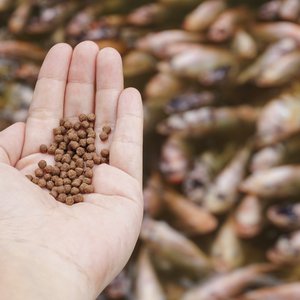Pet Food Recall Update
Pet food manufacturers have voluntarily recalled more than 100 brands of dog and cat food across the nation since March 16, 2007. The recall was pr
FDA, through CVM, regulates the manufacture and distribution of feed ingredients and c
Within 24 hours of learning about the pet food problem, FDA investigators were on-site at the
At the same time, FDA consumer c
A
The Melamine and Wheat Gluten Connection
Melamine is a molecule that has a number of industrial uses, including use in manufacturing cooking utensils. It has no approved use in human or animal food in the
Wheat gluten is a mixture of two proteins obtained when wheat flour is washed to remove the starch. It is s
FDA is not 100 percent certain that melamine, a relatively non-toxic substance, is the cause of the spate of pet illnesses and deaths. Although s
"While the levels we've found to date in both the finished pet food product and the wheat gluten are below what would be considered toxic in rodents, there is extremely little data in the scientific literature on melamine exposure in dogs and cats," said Stephen F. Sundlof, D.V.M., Ph.D., Director of the Food and Drug Administration's Center for Veterinary Medicine (CVM).
"Regardless, the association between melamine in the kidneys of cats that died and melamine in the food they consumed is undeniable."
Now FDA must attempt to determine whether or not it is the melamine itself that is the culprit, or whether it's s
Tracking Down Wheat Gluten
By examining import records obtained during its investigation, FDA identified the distributor of the contaminated wheat gluten as ChemNutra of Las Vegas. The firm supplies ingredients to pet food c
"At this time in the ongoing investigation, there is no evidence that any imported wheat gluten contaminated with melamine has entered the
An Active Investigation
FDA's investigation remains open and active, and the agency continues to follow leads to get closer to the root cause of the pet food problem, says
As the investigation continues, FDA scientists will review blood and tissue samples of affected animals to understand how melamine contributed to the pet illnesses. "This understanding will provide valuable information about the cause of this outbreak, and what FDA and the pet food industry can do to avoid this type of problem in the future," says Sundlof.
On April 18, 2007 Wilbur-Ellis C
Wilbur-Ellis noted that it obtained rice protein fr
Last Sunday, April 15, Wilbur-Ellis notified the U.S. Food and Drug Administration that a single bag in a recent shipment of rice protein concentrate fr
Wilbur-Ellis began importing rice protein concentrate fr
On April 16, a pet food distributor issued a voluntary recall of its pet food, believing the source of contamination to be rice protein concentrate supplied by Wilbur-Ellis. As an additional precaution, Wilbur-Ellis is urging all pet food manufacturers using rice protein concentrate supplied through Wilbur-Ellis to recall any pet food that may be on supermarket shelves.
Hammersmith Marketing Ltd. announced today (April 21, 2007) that it has stopped all shipments of protein meal products fr
“It is our understanding fr
“The c
Search Combined List of Recalled Pet Food Products (Browse by cat or dog food brand or do a search)










